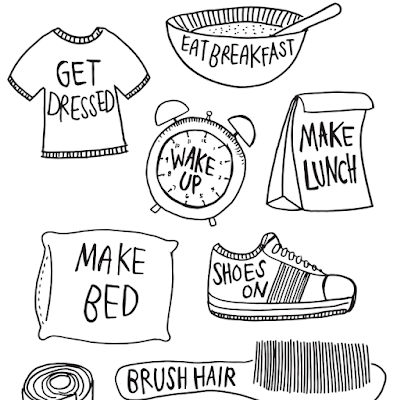In the past I have written about routine as an important element of recovery here "https://bpdlifeinthemoment.blogspot.com/2014/10/routine-bars-of-protection-or.html" For many, one of the most important parts of treatment or therapy, particularly when it lasts a lengthy period of time, is that it provides and external routine on my life. As well as the natural sense of loss at the ending of the therapeutic relationship and important structure is removed at the time of discharge.
Early in the recovery journey I found it difficult not to immediately go back to the routines I had before I asked for help and finally had to give up my job. Problem was the life I thought I was living was completely different. It had to be, after all the way I had been living my life before had led to me becoming completely emotionally and mentally exhausted.
It took me a while and several months during which there were moments when emotional exhaustion returned because I tried to do too much too soon. Any new skills, or routines, no matter how good they will be for me, can take additional mental and emotional effort, simply because I am still becoming used to them.
Be kind to yourself, has to be the refrain - my broken leg, may have had the cast removed, but the muscles around the healing bone need regular practise and exercise to be built up around the bone, in order to make the most of recovery.
Looking back I think I focused on mastering new and forgotten skills to help me rebuild, in stages. I would identify these now as follows:
1) Keeping 'Body and Soul' together. There are certain tasks, or routines which literally keep us alive. Eating, drinking, sleeping. When beginning to recover from any illness these are essential to keeping the body going, so the mind and emotions can recover effectively. I remember the time when getting out of bed, making regular time for meals and noticing when I was thirsty, actually used up all the energy I had. I would sleep in the middle of the day, because, emotions are exhausting - what told me that this was necessary was the fact that I could still go to bed at a routine time and sleep despite having had naps.
2) Building Self Management. DBT teaches me skills over a sustained period of time. The challenge without the group skills and one to one therapy is to continue to build habits which help me to maintain management of my condition. Because skills such as Emotional Management, Mindfulness and Relationships have routines built into them, the maintenance of them, helps to create a routine in itself.
3) Finding Joy'Glimpses of Glory' is a way a friend of mine heard about last year, when a group of friends were reflecting on the past year just after the Christmas Holidays. Since 2016 when both Brexit and Trump blew onto the world stage, there has been a tendency when reflecting to focus on the negative in the world around us. Instead, looking for 'Glimpses of Glory' encourages us as we reflect to ask that we see the moments of good, the joy we find in the small things in us. When we are rebuilding after a period of illness, we may struggle to see the positive, it can be a symptom of emotional exhaustion. In spite of the fact that I struggle to socialise, I know that there are nurturing relationships and friendships, which I need to build into the fabric of my life. Again, it begins with a small step in opening myself up to friendship....relationships take time to build, but by making meeting up part of my routine, I can begin to make a path out of isolation. To find people who may be good for me, I need to acknowledge the things in life that I enjoy. Where are my Glimpses of Glory....then the next step, are there others who share my joy in these things? It's hard to walk in somewhere new, but when I have a focus, a class, a hobby, a sport, it can help to distract me. It also helps me to connect with the community around me, if I can help in simple ways by volunteering - there are so many opportunities starting with making brews and washing dishes at your local parent toddler group, for example.
These are just small ways that I have rebuilt a routine, which is a safe structure in which to build a new life, where I can manage my condition effectively. Recovery is not a straight line, there have been hiccups and setbacks along the way. But the trend has been towards a more meaningful life for me. Looking back I wasn't ready to move on stage to stage until, the effort needed to maintain new routines has reduced - moving on overlapped at times - life isn't made with beautifully straight edges, like me, the pieces of my routine jigsaw, can be messy!
Reflections on life with BPD. Experience of using DBT to manage ESPD/BPD symptoms. Wanting to connect and encourage others struggling with Mental Illness. Stop the Stigma - the best way to learn about my Mental Health is to ask me about it...
Sunday, 25 November 2018
Subscribe to:
Post Comments (Atom)
-
Emotions for most people naturally seem to come and go. Most people experience either euphoria, grief or anger as passing extremes. For me, ...
-
"When you need me, but don't want me, then I'll stay. When you want me, but don't need me, then, I'll have to go"...
-
'Treating someone with borderline personality disorder can be one of the toughest challenges a [social worker] encounters. Life for suc...






No comments:
Post a Comment